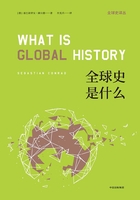Mill's(24)lamentation over the pettiness of modern English statesmen is familiar.What is really implied?England,as Mill the democrat would have said,was once a country of castes:the priest,the noble,the merchant,the peasant,represented distinct types.Each class was bound by an unalterable custom and conforms to inherited traditions;each,again,discharged some simple or general function now distributed among many minor classes.In later phrase,modern England has been made by processes of 'differentiation'and 'integration.'The old class lines have disappeared,the barriers of custom have been broken down,the old functions have been specialised,and instead of independent individual action,the whole system of life depends upon the elaborate and indefinitely ramified systems of co-operation,deliberate or unconscious.The obvious result is a growth of organic unity,accompanied by an equal development of diversity.Each unit can be assigned to a more special function,because other functions are assigned to co-operating units,and greater mutual dependence is implied in the greater variety of careers and activities.In his democratic phase,Mill blesses this process altogether;he approves the destruction of privilege and caste distinctions;he approves the 'division of labour,'the increased diversity of occupation,and the consequent growth of co-operation;he desires the fuller responsibility of the ruling class or the closer dependence of government upon the people.But in the later phase,when he emphasises the evils of democracy,does he not condemn what is a necessary implication in the very process which he approves?The division of labour,he now observes,narrows a man's life and interests;the necessity of co-operation narrows the sphere of 'individuality';and the process which gives diversity to society as a whole implies certain uniformities in the social atoms.The less the variety in the units,the greater is the facility of arranging them in different configurations.The eccentric man is a cross-grained piece of timber which cannot be worked into the state.
'Individuality'is so far a hindrance to the power of entering into an indefinite number of combinations.And yet so far as 'individuality'diminishes,the responsibility of government means the subordination of rulers to the average commonplace stupidity.What,then,is the 'individuality'which may be called unconditionally good?How are we to define the danger so as to avoid condemning the conformity which is a necessary implication of progress?How are we to manage 'differentiation'at the expense of 'integration';to exalt such 'individuality'as is incompatible with 'sociality';and to regard 'eccentricity'and 'antagonism'and contradiction as valuable in themselves instead of accidental results in particular cases of originality which in some sense is priceless?Here,I think,is the real difficulty.
Have we to deal with forces necessarily 'counteracting'each other,in Mill's phrase,or with forces which can be combined in a healthy organism?Mill undoubtedly supposes that some conciliation is possible.The historical view has shown the evil.
We have now to consider the remedy to be applied to the various forms in which it affects economic,political,and ethical conditions.The general principle has been given.
'Self-protection'is the only justification for the interference of society with the individual.Although absolute liberty would mean anarchy,we may still demand a maximum of liberty,and suppress such a use of liberty by one man as would in fact restrain the liberty of another.Mill,like Bentham,holds to the purely empirical view.Interference is bad when the harm caused by the coercion is not counterbalanced by the good.
Bentham's doctrine is not only plausible but,within a certain sphere,points to one of the most obvious and essential conditions of useful legislation.The Utilitarians were always affected by the legal principles from which they started.In the case of criminal law,Mill's principle marks the obvious minimum of interference.A state must suppress violence.If I claim liberty to break your head,the policeman is bound to interfere.
If you and I claim the same loaf,the state,even if it be a communistic state,must either settle which is to eat it,or leave us to fight for it.And,again,if the principle does not fix the maximum of legislation,it points to the most obvious limiting considerations.The state means the judge and the policeman,who cannot look into the heart,and must classify criminal action by its definable external characteristics.It can reach the murderer but not the malevolent man,who would murder if he could.It is therefore incompetent to punish wickedness except so far as wickedness is manifested by overt acts.If it went further it would be unjust,because acting blindly,as well as intolerably inquisitorial.Nor can it generally punish actions which produce no assignable injury to individuals.To punish a man for neglecting definite duties is necessary;but to try to punish the idleness which may have caused the neglect would be monstrous.The state would have to be omniscient and omnipresent,and at most would favour hypocrisy instead of virtue.Briefly,the law is far too coarse an instrument for the function of enforcing morality in general.It must generally confine itself to cases where injury is inflicted upon an assignable person and by conduct defined by definite outward manifestations.This had been clearly stated by Bentham.Mill,in his chapter on the 'limits of the authority of society upon the individual,'insists upon objections obvious in the legal case.Can we deduce from these legal limits a general principle defining the relation between society and its units?I notice first the difficulty already suggested by the Political Economy.
IV.ECONOMIC APPLICATION















